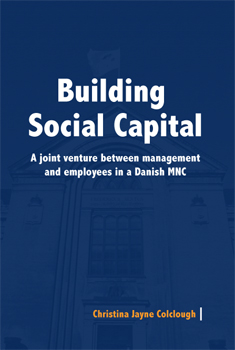Building Social Capital
- A joint venture between management and employees in a Danish MNC
PhD thesis by Christina Jayne Colclough
 This PhD fills a range of gaps in the current literature within the field of research on MNCs and the eventual diffusion of headquarter HR policies to foreign subsidiaries by: bringing the voice of the employees back into research, and by focussing not only on what a corporation officially says it will do in its policies, but also on what it formally and informally does through its practices. The research draws on interviews with management and employees from three subsidiaries of a Danish MNC in Denmark, Poland and Russia respectively.
This PhD fills a range of gaps in the current literature within the field of research on MNCs and the eventual diffusion of headquarter HR policies to foreign subsidiaries by: bringing the voice of the employees back into research, and by focussing not only on what a corporation officially says it will do in its policies, but also on what it formally and informally does through its practices. The research draws on interviews with management and employees from three subsidiaries of a Danish MNC in Denmark, Poland and Russia respectively.
Interviewing especially the employees provided information that highlighted the significance of the level of abstraction when discussing diffusion processes and outcomes. Whilst diffusion was only partial on the abstract level of policies, it was more evident on the more concrete level of formal and informal practices. By unravelling the nature of these practices, it became clear that the Danish (expatriate) managers were enacting the institutions of the corporate culture, namely trust, friendliness, cooperation and codetermination. This culture, in turn, had developed in what are indications of close relations with both the owners’ values and norms, and the institutions of the Danish model of labour market regulation. Hence, at this lower level of abstraction diffusion took place into institutional environments that are distinctively different from that of the home country.
Coupling these findings with the horizontal and vertical inter- and intra-subsidiary networks that are created through the work organisation, tenure and career paths, the analysis subsequently showed that the corporation has the structures as well as the inter-personal relations that constitute the three dimensions of social capital; namely cognitive, relational and structural capital. Revisiting the findings, the thesis identifies the key role of so-called ‘team-spanners’ in the reproduction of social capital. These team-spanners are not only management, but just as importantly shop stewards and employees with flexible skills and longer tenure. The thesis concludes that the corporation, albeit unintentionally, is building social capital in all three subsidiaries, thus potentially improving their learning abilities. Finally, addressing a degree of fuzziness in social capital research, an analytical model for use in future social capital research has been developed based on the identification of the key factors that influence corporate social capital.
Link to Academic Books
 The PhD thesis can now be bought at Academic Books, Øster Farimagsgade 5, 1353 Copenhagen K.
The PhD thesis can now be bought at Academic Books, Øster Farimagsgade 5, 1353 Copenhagen K.
